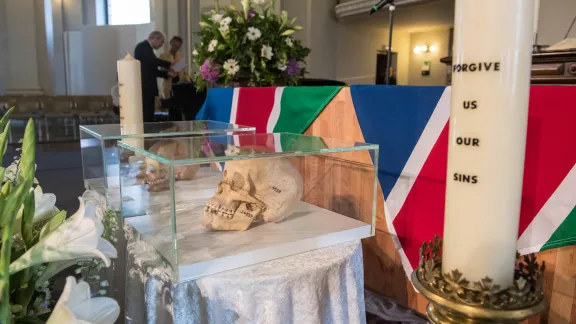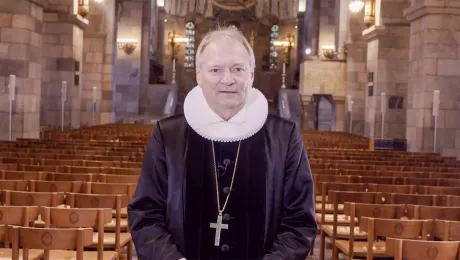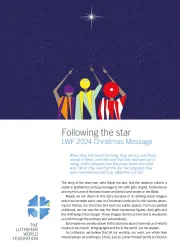
Marking the occasion of the return of mortal remains taken from Namibia to Germany during the colonial period, a commemorative service was held in Berlin, Germany, by the Evangelical Church in Germany (EKD) and the Council of Churches in Namibia. Photo: EKD/Christian Ditsch
Commemorative service marking the repatriation of mortal remains from former German Southwest Africa
(LWI) – On Wednesday, 29 August, Germany gave back to Namibia mortal remains that it had taken out of the country during the colonial period (1884 to 1919). To mark the occasion, a commemorative service was held by the Evangelical Church in Germany (EKD) and the Council of Churches in Namibia in Berlin’s Französische Friedrichstadtkirche.
Immediately after the service remains were handed over to the Namibian government representatives in an official act by the German Foreign Office and the Namibian embassy. On 31 August they are to be received at a state ceremony in Windhoek, Namibia.
Ernst //Gamxamûb, bishop of the Evangelical Lutheran Church in the Republic of Namibia – a member church of the Lutheran World Federation (LWF) – and head of the delegation of the Council of Churches in Namibia, gave a joint sermon with Petra Bosse-Huber, EKD bishop for ecumenical relations. In it, Gamxamûb recalled the history of Namibia and Germany, which had been “born of a very bad experience and reality.”
Learning from the past to write anew the future
Bishop Gamxamûb urged the congregation: “Let us therefore learn from our past to write anew our future, characterized by the following values: human dignity, respect, equality, good cohabitation, empowering one another to exercise peace and justice.” When visiting a UNHCR camp in Botswana in 1980, he said, he had had an unforgettable experience. He heard Namibian refugees singing a moving lamentation, which they did every evening: “When I die here, let my bones be returned home.”
Let us therefore learn from our past to write anew our future, characterized by the following values: human dignity, respect, equality, good cohabitation, empowering one another to exercise peace and justice.
Bishop Bosse-Huber declared: “This day moves me greatly. We intend to do something today which should have been done many decades ago: namely, to give back mortal human remains of people who became the victims of the first genocide of the 20th century, to their rightful descendants.”
Keeping memory alive and overcoming wrong
At its Twelfth Assembly in Windhoek, Namibia in May 2017, the LWF adopted a Public Statement on Reconciliation with respect to genocide in Namibia.
It says: “We are encouraged to know that the governments of Namibia and Germany have taken up this pain and are committed to a process of telling the truth and doing justice in view of what they both call today a genocide against the Herero, Nama, and other indigenous people. We are grateful for the role of churches and civil society groups that have promoted and continue supporting processes of reconciliation and healing of memories.”


